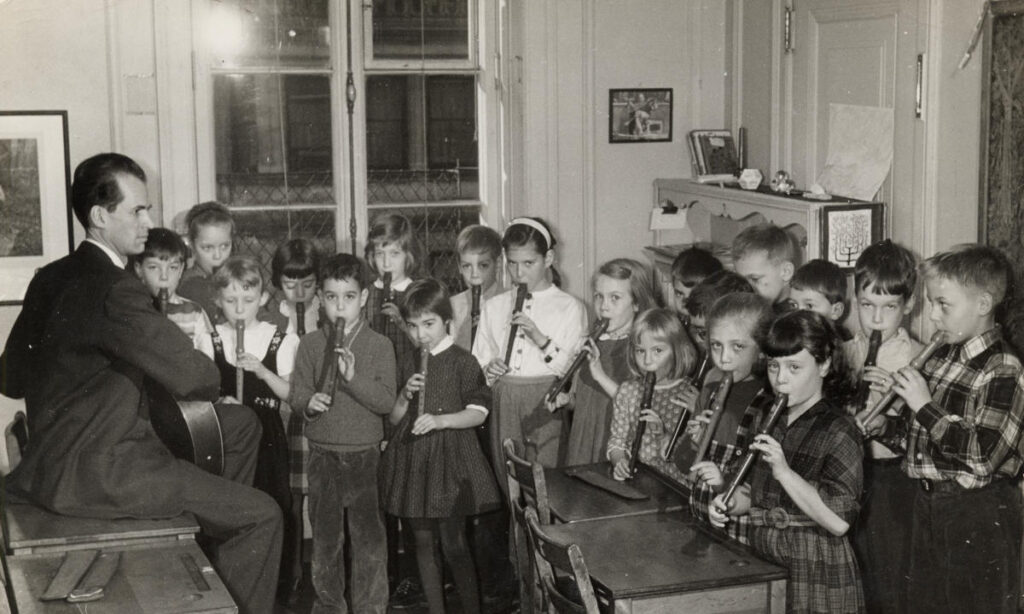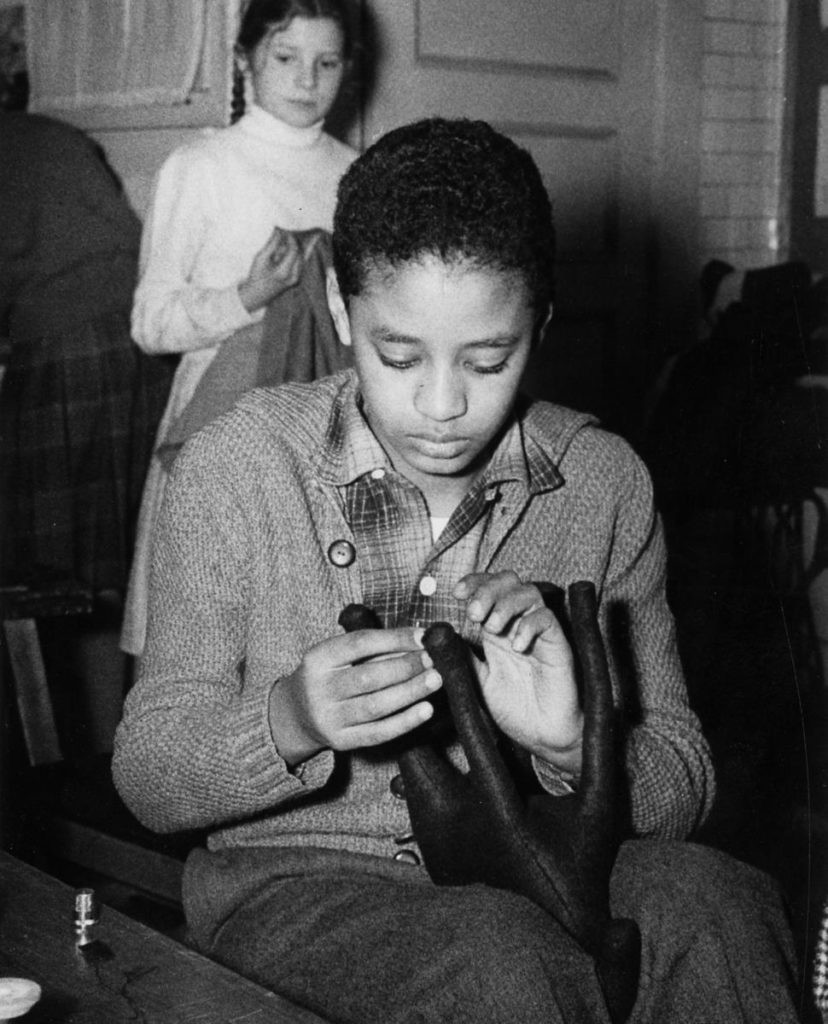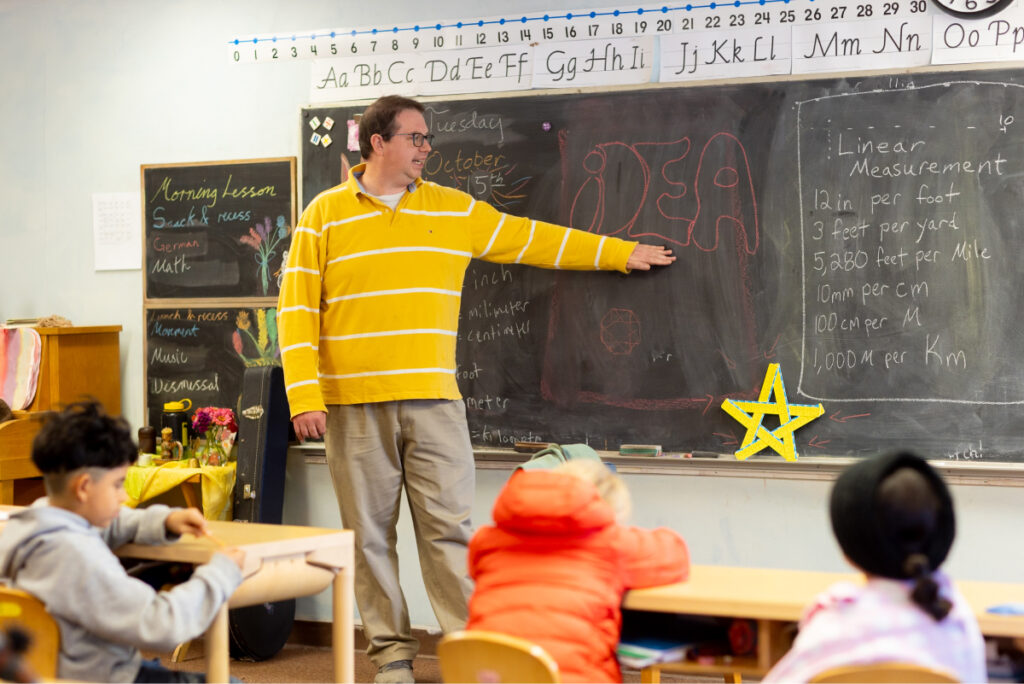History & Context
Following the devastation of WWI, German factory owner Emil Molt was looking for something more valuable than money to offer his workers.
Inspired by the philosophy of scientist and philosopher Rudolf Steiner, Molt approached Steiner and asked him for help in developing a school for the factory workers’ children. The first Waldorf school opened in 1919, offering a transformative education that centers the child over systems– in other words, a more human way of learning.

Anthroposophical Roots
Steiner developed Waldorf education based on his observations of human development and our role in the world. He borrowed the term “Anthroposophy” to describe his philosophy, which basically translates to “the study of the wisdom of the human being.”
This includes the wisdom of:
- Our bodies: how we develop physically from conception to death
- Our intellect: how we learn, think, analyze and make decisions
- Our emotions: how our feelings can guide, inform, and heal us
- Our spiritualiity: how concepts such as gratitude, reverence, and generosity ground us
Ultimately, Anthroposophy seeks to create a healthier society, which Steiner believed starts with raising holistically healthy children into healthy adults. With this in mind, Steiner created Waldorf education as a force for positive social change.


Purpose
With its Anthroposophical foundation, Waldorf education creates an environment for each child to know themselves, set their own direction, and move forward freely in life.
As we say here at Madison Waldorf School, we “nurture each student to have intellectual creativity, emotional resilience, and purposeful engagement in their communities, while giving them the tools to thrive in an ever-changing world.”
Frequently Asked Questions
Is Anthroposophy a religion? Are Waldorf schools religious?
No, Anthroposophy is not a religion nor are Waldorf schools religious. While Anthroposophy recognizes the spiritual aspect of existence, it does not adhere to any religion nor does it create its own – there are no deities in Anthroposophy nor any form of worship. Anthroposophy is simply a philosophy, a mindset– in fact, Steiner described Anthroposophy as “a tool for understanding of religions.” In short, Anthroposophy practices spiritually outside of religion, acknowledging that everyone’s path is different. At the same time, it recognizes patterns of wisdom within multiple religions and traditions, which is why Waldorf students study various mythologies and religions as they become developmentally ready to analyze and examine them.
Do I need to agree with Anthroposophy to join a Waldorf school?
No, you do not need to agree with Anthroposophical principles to join a Waldorf school.
Are students taught Anthroposophy?
No, students are not taught Anthroposophy. Students are encouraged to be curious and ask questions in order to make their own decisions.
What sets Waldorf education apart?
Waldorf education arose out of an understanding of human development and the desire to grow healthy children into healthy adults, thereby establishing Waldorf education as a force for social change. You can read more about Waldorf’s human-centered approach in our program overview, “Nurturing the Child.”
Why do Waldorf schools discourage screens?
For decades, Waldorf has been on the forefront of recognizing the risks of children growing up immersed in problematic screen and phone content. Not only does screen usage hinder children’s imagination, it displaces vital childhood experiences necessary to healthy development. We are currently seeing the effects that extensive screen exposure is having on our children, as our youth are struggling with the worst mental and emotional health crisis in our history. We discourage screen usage because we prioritize the child over subject material.
What qualifications do Waldorf teachers have?
All Waldorf teachers have, at a minimum, a Bachelor’s degree and a completed (or in process) Waldorf teaching certificate.
What is “looping” and why is it important?
“Looping” is the policy by which a teacher stays with the same student cohort throughout their educational journey, ideally from first through eighth grade. This creates a deep relationship of understanding and trust between the teacher, students, and families. Teachers and families work together to carry the children with loving intentionality through every phase, informed by past experiences and the strong foundation they have built together.
How well do students transition into or out of a Waldorf school?
For students wanting to enter our school, we have a preliminary teacher meeting with both the child and parents, followed by a three-day trial. This enables everyone involved to see how the child would adjust and integrate into the classroom, as well as how we can best support the child.
For students transitioning out of our school, it depends on the age of the child and where they are going. Our graduates, however, adjust quickly to different learning modalities, thanks to our experience- and inquiry-based approach.
What is the admissions process?
We have a rigorous admissions process to ensure a good fit for the child and everyone involved. You can see the steps outlined on our Admissions page.
How much is annual tuition?
Tuition depends on a variety of factors, including the child’s age/grade, schedule the family chooses (Early Childhood only), and eligibility for our Accessible Education Grant.
You can learn more on our Tuition & Financial Aid page.
If you have any other questions that are not answered here, we encourage you to schedule a tour. All tours are personalized and last approximately an hour; all questions are welcome.